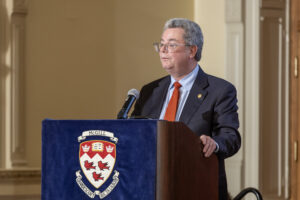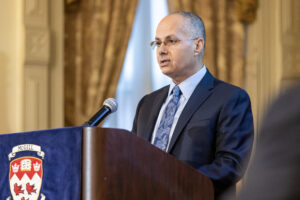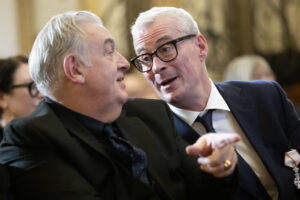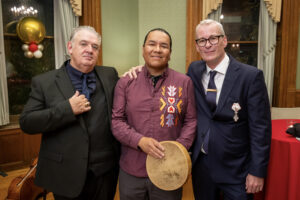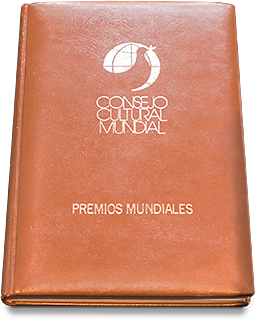
The 39th World Cultural Council Award Ceremony as successfully hosted by McGill University at its historic downtown campus in the city of Montreal, Quebec, Canada, on Wednesday, October 23, 2024.
The 2024 Awards
At this event, the Albert Einstein World Award of Science and the Leonardo da Vinci World Award of Arts were conferred upon distinguished leaders in their respective fields, in recognition of their tireless pursuit of the advancement of human culture and well-being. In addition, four young academic leaders from McGill received special recognition at the ceremony for their remarkable performance early in their careers through their groundbreaking and impactful work.
Speaking at the ceremony, Provost Christopher Manfredi said “…the purpose of this afternoon’s award ceremony is, I believe, multifaceted. First it is of course a wonderful occasion to celebrate the work of two outstanding individuals both richly deserving of recognition. Irish author, playwright, and filmmaker Cónal Creedon winner of the Leonardo da Vinci World Award of Arts and upon Danish evolutionary biologist Eske Willerslev, winner of the Albert Einstein World Award of Science. We look forward to honouring their work and achievements. Second, by highlighting their contributions along with those of four promising McGill scholars also honoured here this afternoon; we are reminded of the powers of the Arts and Sciences to deeper our understanding of our own humanity and our interconnectedness to the environment that surround us.”
Professor Omar Yaghi expressed the thoughts of Sir Fraser Stoddart, “It is a great pleasure for the World Cultural Council to celebrate its 39th Award Ceremony at McGill University, one of the leading seats of learning in Canadian and, indeed, in the world. We are delighted to enhance our relations with such institutions through a higher event that underlies our common values and joint efforts directed toward the benefit of humankind. These aims blend perfectly with the vision of the World Cultural Council, which seeks to contribute to a culture which brings the inhabitants of this planet towards a better world, in which all differences are respected, a culture that promotes progress and fulfils our life with enriched attainments.”
Eske Willerslev, Professor of Evolutionary Biology at the University of Copenhagen and Prince Philip Professor at the University of Cambridge, is the winner of the Albert Einstein World Award of Science 2024. Prof. Willerslev is credited with establishing the field of environmental DNA as a revolutionary means of understanding ourselves as humans and the world surrounding us. His broad scientific impact forces us to rethink the origins and evolution of human groups, languages, and behaviour. His discoveries have influenced how scientists’ approach Indigenous communities. He has respectfully worked alongside Indigenous Peoples on several continents and his findings have resulted in the repatriation of various human remains to their rightful descendants.
In his acceptance speech, Professor Eske Willerslev thanked the WCC for recognizing his work:
“I see the award as a great acknowledgment of the scientific fields of ancient human genomics, pathogen genomics, and environmental DNA – fields that I have spent my entire career on.
“These fields are revolutionizing the way we understand ourselves as humans and the world surrounding us. Through this research, we have learned that our species has been mobile as far back as we can track human history and that the world we know today, with populations located in specific geographical regions, is, for the most part, very recent. We, as humans, are all closely related and share a common past and history, something we should not forget in times of conflict.
“We have also learned that disease outbreaks, like the one we faced recently, go much further back in time than previously thought and have shaped our demography and genetics both historically and prehistorically.”
The 2024 World Cultural Council Leonardo da Vinci Award of Arts, has been awarded to novelist, playwright, documentary film maker, essayist, and collaborative artist, Cónal Creedon. Through his artistic works, Cónal Creedon has received acclaim for peeling back the layers of Cork city’s history and culture with insights from different periods of his life. He captures its essence, while simultaneously providing a vivid portrait, as he immerses the reader into his hometown. His detailed investigation of such a tight-knit neighbourhood reveals insights into the universal nature of the human condition and constitutes a significant contribution to the artistic legacy of creative expression.
Cónal Creedon acknowledge the award by saying:
“It’s a great personal honour for me to accept this award. It is an honour for my home place of Cork city in Ireland – and indeed, it is an honour for Irish people across the world. It is extremely special to have the luxury – to be able to work at what I love doing. So, it is very humbling for me to receive the World Cultural Council – Leonardo da Vinci Award of Arts for effectively following my own heart, indulging my passion, and living my dream.”
Special Recognitions
The four special recognition recipients are promising young research leaders at McGill University. Alicia Boatswain-Kyte, Assistant Professor at the School of Social Work; Jin Guo, Assistant Professor at the School of Computer Science; Kristy Ironside, Associate Professor of Russian History at the Department of History and Classical Studies and Nagissa Mahmoudi, Assistant Professor at the Department of Earth and Planetary Sciences.
Award Ceremony
Gallery
Photos by Owen Egan and Joni Dufour
Speeches
- Welcoming Speech, Sir Fraser Stoddart, President World Cultural Council, (Presented by Omar Yaghi, Vice-President, WCC)
- Salutatory Speech, José Estrada, Founder and President Emeritus World Cultural Council (Presented by René Asomoza Palacio, Vice-President, WCC)
- Acceptance Speech, Eske Willerslev, Winner of the 2024 Albert Einstein World Award of Science
- Acceptance Speech, Cónal Creedon, Winner of the 2024 Leonardo da Vinci World Award of Arts
- Winner’s book, Gary Marquis



